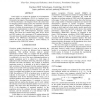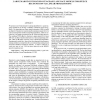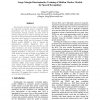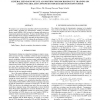ICASSP
2011
IEEE
14 years 5 months ago
2011
IEEE
In this paper, we examine the problem of text-independent open-set speaker identification (OS-SI) in broadcast news. Particularly, the impact of the population of registered speak...
130
click to vote
ICASSP
2011
IEEE
14 years 5 months ago
2011
IEEE
In this paper, we extend our previous study on discriminative training using non-uniform criteria for speech recognition. The work will put emphasis on how the acoustic modeling i...
125
click to vote
ICASSP
2011
IEEE
14 years 5 months ago
2011
IEEE
Recently, i-vector extraction and Probabilistic Linear Discriminant Analysis (PLDA) have proven to provide state-of-the-art speaker verification performance. In this paper, the s...
114
click to vote
CSL
2010
Springer
15 years 2 months ago
2010
Springer
Recently, discriminative training (DT) methods have achieved tremendous progress in automatic speech recognition (ASR). In this survey article, all mainstream DT methods in speech...
120
click to vote
ICASSP
2010
IEEE
15 years 2 months ago
2010
IEEE
We present a novel discriminative training algorithm for n-gram language models for use in large vocabulary continuous speech recognition. The algorithm uses large margin estimati...
109
click to vote
NIPS
2008
15 years 3 months ago
2008
Neuroimaging datasets often have a very large number of voxels and a very small number of training cases, which means that overfitting of models for this data can become a very se...
124
Voted
ANNPR
2008
Springer
15 years 4 months ago
2008
Springer
In applications such as character recognition, some classes are heavily overlapped but are not necessarily to be separated. For classification of such overlapping classes, either d...
134
click to vote
SEMCO
2007
IEEE
15 years 8 months ago
2007
IEEE
Discriminative training has been a leading factor for improving automatic speech recognition (ASR) performance over the last decade. The traditional discriminative training, howev...
128
click to vote
ICASSP
2009
IEEE
15 years 8 months ago
2009
IEEE
We propose a new optimization algorithm called Generalized Baum Welch (GBW) algorithm for discriminative training on hidden Markov model (HMM). GBW is based on Lagrange relaxation...
133
click to vote
ICML
2009
IEEE
16 years 2 months ago
2009
IEEE
In this paper, we investigate a simple, mistakedriven learning algorithm for discriminative training of continuous density hidden Markov models (CD-HMMs). Most CD-HMMs for automat...




